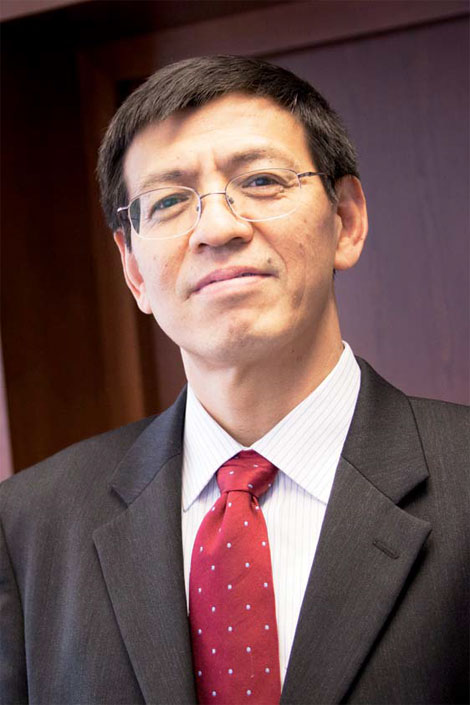When food needs to be put on the table
Updated: 2014-06-06 08:16
By Martin Banks (China Daily Europe)
|
|||||||||||
|
Fan Shenggen says China is well positioned to improve food security and nutrition at the global level. Provided to China Daily |
China can play an important role in helping end world hunger, expert says
An official spearheading the global fight against chronic hunger says China has a big role to play in advancing food security.
But Chinese-born Fan Shenggen, director-general of the International Food Policy Research Institute, says that to do so China needs a "new round of institutional innovations".
Beijing, he says, must also do more to promote food production systems that are adapted to "emerging challenges".
The institute, which Fan has headed since 2009, is a global organization committed to ending hunger and poverty.
The 52-year-old Fan says that his homeland has experienced an expansion of agricultural output over the last several decades despite a shrinking amount of arable land.
He says wheat and maize production, which increased by four and six times, respectively, between 1970 and 2010 compared with the average global increase of two and three times.
China is the largest producer of wheat and rice and the second-largest producer of maize, and the country, he says, also has become the largest producer of high-value food products.

Between 1970 and 2010, meat, fruit and vegetable production grew by 11 fold, 27 fold and 13 fold, respectively. Based on recent projections, Fan says, China's "dominance" in the production of a number of agricultural products is expected to continue over the next decade.
"China influences global food security not only through production, but also through consumption, and the Chinese population consumes an increasingly large share of the world's fruit, vegetables and meat," says Fan, formerly known for his work in rural development in China.
China is now responsible for more than half of global vegetable consumption and almost a third of global meat consumption, he says, citing the Agricultural Outlook of the Organization for Economic Cooperation and Development and the Food and Agriculture Organization of the United Nations.
"In contrast, China's share of global grain consumption has progressively declined in recent years mainly due to a growing and more affluent and urban population."
Another area in which China influences global food security is through international trade, says Fan, who is based in Washington.
China has taken "significant steps" to open its markets to international trade since the 1990s and is now the sixth largest exporter of agricultural products, says the World Trade Organization.
"But there is significant variation across products," Fan says. "While China is close to self-sufficiency in key staple crops, such as wheat, rice and coarse grains, it is heavily dependent on imports of oilseeds, vegetable oils and (increasingly) milk products."
He expects that China will import more staple grains in the future, partially driven by the rising demand for feed in line with its comparative advantage in the production of more labor-intensive food products such as vegetables.
China is well positioned to improve food security and nutrition at the global level, Fan says. He recommends Beijing implement a "four-point action plan" to bolster such improvements.
Recommended measures include implementing "institutional reforms for more efficient and safer food production systems", says Fan, a graduate of Nanjing Agricultural University.
"China needs a new round of institutional innovations that maximize the efficiency of food production systems to produce more and safer food. An important step in producing more food is to use farmland more efficiently and equitably."
The Chinese authorities, he says, should also increase support for "climate-smart, sustainable and nutrition-sensitive agricultural research and development"
One example is the development of "resource efficient" agricultural technologies and practices that enable the production of more food while using fewer resources, such as intercropping growing two or more crops in proximity and solar panel drip irrigation.
"These will be critical," he says.
China also needs to promote "mutually beneficial" trade and "more effectively use" increasingly integrated international trade markets to make food production more suited to domestic resource endowments.
"China can take advantage of its large rural labor force by exporting more labor-intensive agricultural goods such as fruit, vegetables and aquatic products, while importing more land- and water-intensive agricultural products such as cereals and vegetable oils," Fan says.
Supporting the exchange of technologies and know-how among developing countries and donors is another proposal for the Chinese.
"Collaboration and mutual learning between China and other developing countries should be leveraged as an instrument to improve food security in the developing world.
"China can share its development technologies and expertise about what has and has not worked in terms of food security efforts advice that can often be more relevant than the pathways experienced or advocated by more developed countries."
Fan joined the institute in 1995 as a research fellow and has chaired the World Economic Forum's Global Agenda Council on Food and Nutrition Security since 2012.
This year, he received the Hunger Hero Award from the World Food Program in recognition of his commitment to and leadership in fighting hunger worldwide.
The international community renewed its commitment to enhancing the well-being of poor people around the world by adopting the Millennium Development Goals in 2000.
These goals have served as a framework for the plan and implementing development efforts, but "challenges remain", Fan says.
For example, while the goal of halving the proportion of people living in extreme poverty has been achieved, progress toward halving the proportion of people suffering from extreme hunger is "not on track".
Nearly 850 million people are still undernourished worldwide, he says.
With the deadline for achieving the millennium goals less than two years away, international attention has shifted toward deliberations on how to accelerate progress toward meeting the goals by next year and beyond.
Now underway is a discussion of a post-2015 development agenda that will advance what began with the goals.
"It is important not to pursue environmental sustainability at the expense of poor people's food security and nutrition, and ensure that the post-2015 agenda is people-focused," Fan says. "A win-win strategy should be adopted that promotes synergies and manages trade-offs between food security, improved nutrition, and environmental sustainability but this will require concerted efforts by all stakeholders."
These issues will come under the spotlight as Fan addresses a "Toward the 2015 MDGs" conference this month in Brussels, organized by the Centre for European Policy Studies think tank, where he will highlight the conclusions of the institute's 2013 Global Food Policy report.
In 2013, nutrition grabbed the global spotlight but, Fan says, commitments made by donors, national governments in developing countries, the private sector, NGOs and other stakeholders "must translate into concrete actions" to eliminate of hunger and poor nutrition.
"Ending hunger and under-nutrition is not only a morale issue, it is also an economic issue. Every dollar invested in reducing hunger and under-nutrition will yield $30 dollars on average. Based on successful experiences of Brazil, China, Thailand and Vietnam, we should aim to end hunger and under-nutrition by 2025.
"If adequate resources are allocated, right policies are adopted, and all stakeholders including governments, donors, private sector and civil society are made accountable, the goal to end hunger and under-nutrition by 2025 will be achievable," Fan says.
Global food security and nutrition will be "challenged to a greater extent" by several factors, including increasing population and urbanization, rising incomes and higher demand for food.
"The global food system will not only need to support more individuals in the future, but as urban populations increase and global incomes grow, people will demand more and better food moving away from consumption of traditional staple crops toward a more diversified diet.
"Moreover, growing natural resource scarcities will further threaten agricultural productivity and output. Higher resource constraints will mean the rising demand for food will have to be met with fewer means. Climate change will exacerbate the situation higher frequency and intensity of extreme weather events will negatively affect many farmers around the world."
A rosy outlook it certainly is not, but this award-winning Chinese official says he remains "dedicated" to eradicating the scourge of hunger and poverty.
For China Daily
(China Daily European Weekly 06/06/2014 page32)
Today's Top News
China finds way to play in 2014 World Cup
Protocol targets sex violence
Premier all business on Europe trip
Poland-China train on maiden trip
Iraq facing 'mortal threat' from militants
China, Italy boost ties
Brazil averts strike before WCup
Red meat 'linked to cancer'
Hot Topics
Lunar probe , China growth forecasts, Emission rules get tougher, China seen through 'colored lens', International board,
Editor's Picks

|

|

|

|

|

|






